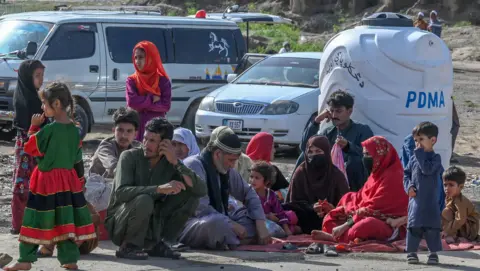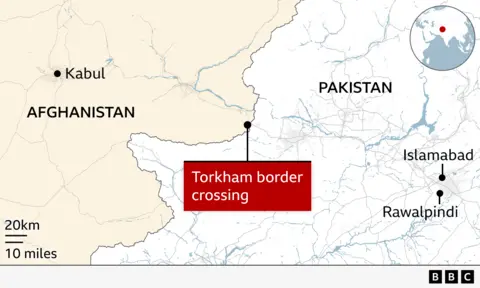Pakistan expels tens of thousands of Afghans

BBC World Service
 Getty Images
Getty ImagesPakistan has deported more than 19,500 Afghans this month, with more than 80,000 of whom were deported before the April 30 deadline, according to the United Nations.
Pakistan has accelerated its motivation to expel undocumented Afghans and those who are temporarily allowed to stay, saying it can no longer cope.
Taliban officials said between 700 and 800 families will be deported every day, with as many as 2 million people expected in the coming months.
Pakistan’s Foreign Minister Ishaq Dar flew to Kabul on Saturday to meet with Taliban officials. His opponent, Amir Khan Muttaqi, expressed “deep concern” about deportation.
Some people have deported Afghans at the border say their families were born in Pakistan after fleeing the conflict.
According to the UN Refugee Agency, more than 3.5 million Afghans live in Pakistan, including about 700,000 people who came after the Taliban acquisition in 2021. The United Nations estimates that half of them are undocumented.
Pakistan has captured Afghans in decades of war, but the government says a large number of refugees now pose risks to national security and put pressure on public services.
Border conflicts between security forces on both sides have recently surged. Pakistan blames them on Afghan militants denied by the Taliban.
Pakistan’s Foreign Ministry said the two sides “discussed all issues of common interests” at a meeting in Kabul on Saturday.
Pakistan has extended the deadline for undocumented Afghans to leave the country by one month until April 30.
At the Torkham crossing, some deported Afghans told the BBC that they left Afghanistan decades ago – or had never lived there.
“I have lived in Pakistan all my life,” Sayed Rahman said. “I got married there. What should I do now?”
Saleh is the father of three daughters, worried about what life under the Taliban rule means to them. His daughter attends school in Punjab, Pakistan, but in Afghanistan, girls over 12 are forbidden to do so.
“I want my kids to learn. I don’t want them to waste their years in school,” he said. “Everyone has the right to educate.”
Another man told the BBC: “Our kids have never seen Afghanistan before, and I don’t even know what it looks like.
At the border, men and women pass through separate gates under the surveillance of the armed Pakistan and Afghan Guards. Some of the people returning were elderly – one was taken to a stretcher and the other was in bed.
Military trucks shuttle from the border to the temporary shelter. Those who originally came from faraway provinces stayed there for a few days, waiting to be transported to their home country.
As the spinning dust sinks into the eyes and mouth, the family gathers under the canvas to escape the heat of 30c. Resources are stretched, and fierce debates often erupt from access to shelters.
The returnees received between £4,000 and £10,000 (£41 to £104) from Kabul authorities, according to Hedayatullah Yad Shinwari, a member of the financial committee appointed by the camp.
Massive deportation has put a lot of pressure on Afghanistan’s fragile infrastructure, with an economy in crisis and a population of nearly 45 million.
“We have solved most of the problems, but people’s arrival naturally brings difficulties,” said Bakht Jamal Gohar, head of refugee affairs at the Taliban. “These people left decades ago and left all their possessions behind. Some of their houses were destroyed during the 20 years of the war.”
Almost every family told the BBC that the Pakistani Border Guard restricts what they can bring – some human rights groups responded to a complaint.
Chaudhry said in his response that Pakistan “has no policy to prevent Afghan refugees from carrying housework with them.”
A man sat in the windy sun, sitting on the side of the road, saying his children begged to stay in Pakistan in the country where they were born. They were granted temporary residence rights, but expired in March.
“Now we will never go back. Not after how we are treated,” he said.
Other reports by Daniel Wittenberg and Mallory Moench






